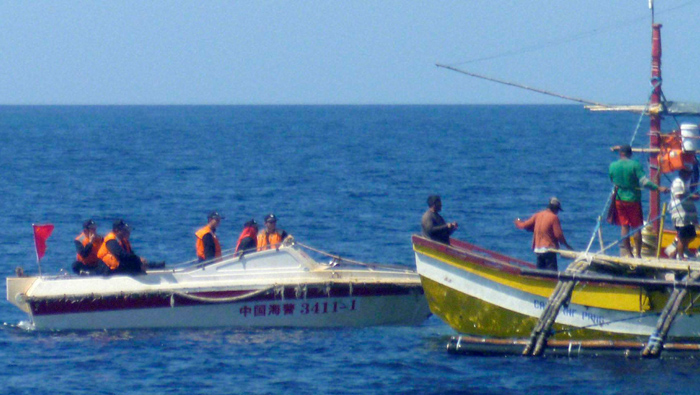
Beijing/Manila: China vowed to take all necessary measures to protect its sovereignty over the South China Sea and said it had the right to set up an air defence zone, after rejecting an international tribunal’s ruling denying its claims to the energy-rich waters.
Chinese state media called the Permanent Court of Arbitration in The Hague a ‘puppet’ of external forces after it ruled that China had breached the Philippines’ sovereign rights by endangering its ships and fishing and oil projects.
Beijing has repeatedly blamed the United States for stirring up trouble in the South China Sea, where its territorial claims overlap in parts with Vietnam, the Philippines, Malaysia, Brunei and Taiwan. "China will take all necessary measures to protect its territorial sovereignty and maritime rights and interests," the ruling Communist Party's official ‘People’s Daily’ said in a front page commentary on Wednesday.
The case, covering a region that is home to one of the world's busiest trade routes, has been seen as a test of China's rising power and its economic and strategic rivalry with the United States. Underscoring China's rebuffing of the ruling, state media said that two new airports in the Spratlys, on Mischief Reef and Subi Reef, both received test flights from civilian aircraft on Wednesday.
Beijing called the Philippines' claims of sovereignty in the South China Sea ‘baseless’ and an ‘act of bad faith’. In a government white paper published on Wednesday, China also said its fishing boats had been harassed and attacked by the Philippines around the disputed Spratly Islands.
"On whether China will set up an air defence zone over the South China Sea, what we have to make clear first is that China has the right to... But whether we need one in the South China Sea depends on the level of threats we face," Vice Foreign Minister Liu Zhenmin told reporters in Beijing, adding that China hoped to return to bilateral talks with Manila.
"We hope that other countries don't use this opportunity to threaten China, and hope that other countries can work hard with China, meet us halfway, and maintain the South China Sea's peace and stability and not turn the South China Sea in a source of war."
United States officials have previously said they feared China may respond to the ruling by declaring an air defence identification zone in the South China Sea, as it did in the East China Sea in 2013, or by stepping up its building and fortification of artificial islands.
China's Liu also took aim at the judges on the tribunal, saying that as not one of them was Asian they could not possibly understand the issue and it was unfair of them to try.
Complicated, unclear
The Philippines reacted cautiously to the ruling late on Tuesday, calling for "restraint and sobriety", but the mood at President Rodrigo Duterte's cabinet meeting on Wednesday was "upbeat", presidential spokesperson Ernesto Abella said.
Philippine Defence Secretary Delfin Lorenzana said he had spoken to US counterpart Ash Carter ahead of the ruling who told him China had assured the United States it would exercise restraint, and the US made the same assurance. Carter had sought and been given the same assurance from the Philippines, Lorenzana added.
"The ruling can serve as a foundation on which we can start the process of negotiations which hopefully will eventually lead to the peaceful settlement of the maritime dispute in the South China Sea," Charles Jose, a spokesman for the Philippines' Department of Foreign Affairs, said.
One of the lawyers who argued the Philippines' case said how and when the country would enforce the tribunal's ruling was complicated.
"There's no timeline for this game. It might have an extended period of gestation," said Florin Ternal Hilbay, a former solicitor general. "I would assume our diplomats have read the decision and understand the complexities and consequences of enforcing the decision."
Global intelligence firm Stratfor said fishermen from China or the Philippines were the greatest potential disruptors in the region, beyond the easy control of law enforcement. "The greatest struggle for both countries will be to rein them in, preferably before they get to sea, lest they disrupt the delicate peace," Stratfor said in a note.
In moves likely to antagonise Beijing, the coastguards of Japan and the Philippines took part in simulated rescue and medical response exercises off Manila Bay on Wednesday, part of what the two countries have called efforts to improve maritime security and combat crime and piracy.
Japan and China are involved in a separate territorial dispute in the East China Sea and Beijing has warned Tokyo against meddling in the South China Sea dispute.